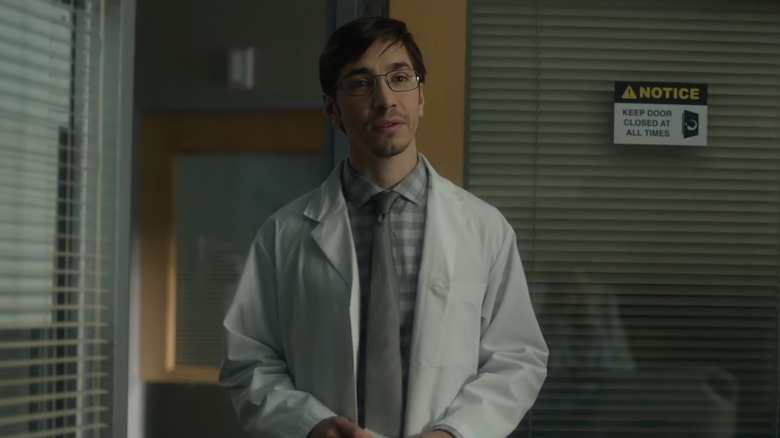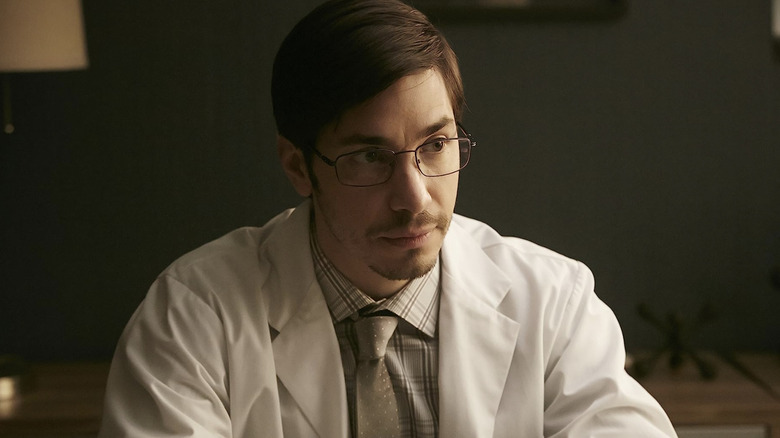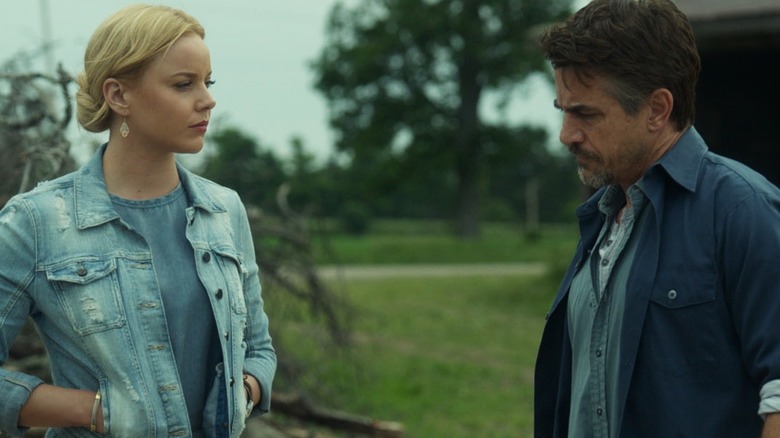Lavender: Justin Long's 'Rotten' Ghost Movie Explained
Since his debut nearly a quarter century ago in the sci-fi spoof "Galaxy Quest," Justin Long has steadily built a resume that includes appearances in projects ranging from gentle comedies like "New Girl" to gory horror flicks like "Jeepers Creepers 2" and "House of Darkness." One of his more confusing projects was the 2016 psychological thriller "Lavender," which also starred Abbie Cornish and Dermot Mulroney. The film baffled and disappointed both critics and audiences, earning scores of 39% and 26%, respectively, on Rotten Tomatoes.
Cornish plays a woman named Jane who suffers amnesia after a car accident, and Long portrays a psychiatrist named Liam who is part of her treatment team. Jane is also traumatized by fleeting memories from her childhood of the murders of her parents and sister. Liam tries to help her piece together the truth from that incident, even encouraging her to visit the house where the murders took place after she learns she has inherited the property.
Jane returns to her childhood home with her husband Alan (Diego Klattenhoff) and daughter Alice (Lola Flanery), where she is reunited with her uncle Patrick (Mulroney). There, she has a series of visions and hallucinations and begins to receive mysterious artifacts from her past, including old photographs of her family.
As Jane's grip on the present slips away from her, Liam begins to warp into her past. In the film's climatic scenes, the film makes its two big reveals when Jane flashes back to that fateful night: Patrick is responsible for the deaths of her parents and sister, and Liam is actually the spirit of her dead father, who has come back to guide Jane to the truth so his soul can be freed.
The film's director admits casting Justin Long was a misdirection
Part of the reason "Lavender" might have missed its mark is that its creator admitted he was aiming at the space between two previous horror classics.
Director and co-writer Ed Gass-Donnelly told Screen Daily in 2016 that while he does not like the "horror" label, he drew on one aspect of the 2001 thriller "The Others," which starred Nicole Kidman and Christopher Eccleston. "The biggest reason I don't like that genre is I really don't believe it," he said. "There's bad reactions. But what I liked about 'The Others' was just that it was such a rich world of performances. They made me believe it through the acting."
Gass-Donnelly further admitted that he may have been a bit too inspired by another previous project. "There were points where I would say, 'I think we're accidentally ripping off 'The Shining,'" he said. "I think it's just where our tastes tend to go."
He also commented on the casting of Justin Long, saying that placing a comedic actor in the role of a mysterious spectral messenger was an intentional misdirection. "You might think it's a little strange casting," Gass-Donnelly said, "but then you play him completely straight with no indication of anything creepy involved... he was able to give a strange, seemingly simple performance. It feels different than what we've seen [him] in before."
The critical reception to Lavender was relatively unkind
While the film's visuals are strikingly beautiful, particularly the shots of the cornfields and old houses, the jump scares are relatively weak. Dermot Mulroney is also underutilized as the film's villain, only getting a chance to shine darkly in the last 15 minutes or so. Meanwhile, Justin Long's performance as a spectral messenger is intriguing and adds a layer of mystery to the film. The best performance is given by Lola Flanery in her acting debut; her conversations with the ghosts that inhabit her mother's childhood home are the most soulful and compelling exchanges in "Lavender," and Flanery's expression of sheer terror during the climactic scenes makes for the film's scariest moments.
Frank Scheck of The Hollywood Reporter criticized the film's confusing yet familiar story, although he did reserve praise for Abbie Cornish's performance and Ed Gass-Donnelly's effective use of cinematography. "The screenplay manages to be simultaneously lacking in coherence and utterly predictable," he wrote. "But the filmmaker does have a talent for creepy visuals that keep the proceedings suitably tense."
In her review, Emma Wolfe of Spooky Astronauts pointed out all of the ways the film was derivative of previous horror classics. She criticized the writing for being cliché-ridden and called the story "a little bit far-fetched." Wolfe did reserve words of praise for the film's conclusion, however, saying she was moved to tears by the way Jane's story was wrapped up. "When an ending is good," Wolfe said," sometimes stuff can be forgiven." If viewers can forgive some unoriginal storytelling, "Lavender" offers some solid performances and striking visuals that make for a pleasant if unremarkable viewing experience.


